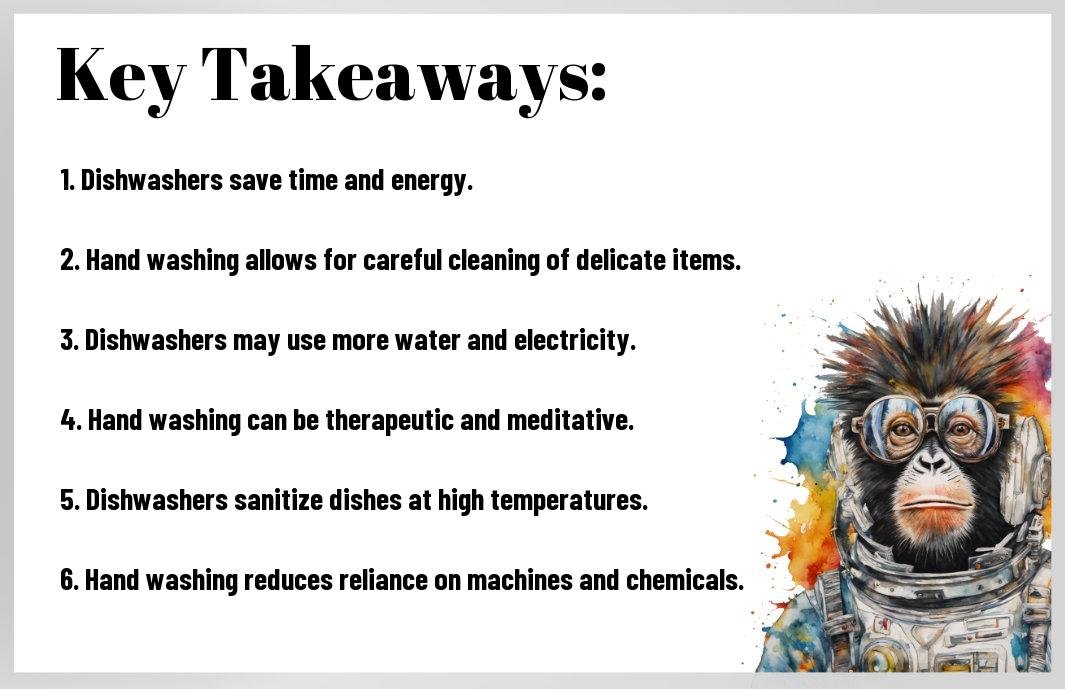Have you ever wondered whether it’s more efficient to wash your dishes by hand or use a dishwasher? The debate has been ongoing for years, with passionate advocates on both sides. In this informative blog post, we will explore the advantages and disadvantages of both methods so that you can make an informed decision on how to tackle this daily chore in your own home. From the time-saving benefits of a dishwasher to the potential for a more thorough clean when washing by hand, we will examine all the factors that go into determining which method is truly better for you and your household. So, let’s dive in and uncover the truth about washing dishes by hand versus using a dishwasher.
Key Takeaways:
- Eco-friendly and water usage: Dishwashers are generally more eco-friendly and water-efficient, especially when running full loads.
- Time and convenience: Using a dishwasher saves time and effort, allowing for more efficient multitasking.
- Sanitization and hygiene: Dishwashers typically sanitize dishes at higher temperatures than hand washing, resulting in more thorough cleaning.
- Effectiveness and cleanliness: Dishwashers can provide more consistent and effective cleaning compared to hand washing, especially for greasy or heavily soiled dishes.
- Energy efficiency: When used properly, modern dishwashers are designed to be energy-efficient, using less water and electricity than hand washing.
- Cookware preservation: Hand washing delicate or non-dishwasher-safe items can help preserve their quality and extend their lifespan.
- Personal preference and lifestyle: Ultimately, the decision between hand washing and using a dishwasher may depend on individual preferences, lifestyle, and circumstances.

Environmental Impact
While both hand washing and using a dishwasher have an impact on the environment, it’s important to consider the factors that contribute to this impact. Understanding the environmental implications of both methods can help you make an informed decision about which approach is best for you and the planet.
Water Consumption Comparison
When it comes to water consumption, using a dishwasher is generally more efficient than hand washing. A typical hand washing session can use up to 27 gallons of water, while an Energy Star certified dishwasher uses as little as 3 gallons per load. This means that by using a dishwasher, you can conserve water and reduce your overall water usage. However, it’s important to note that newer, more efficient faucet aerators and water-saving techniques can help reduce the amount of water you use when hand washing dishes.
| Hand Washing | Up to 27 gallons per load |
| Dishwasher | As little as 3 gallons per load |
Energy Use and Efficiency
When it comes to energy use, using a dishwasher may require more electricity than hand washing. However, newer dishwashers are designed to be more energy efficient, using less water and energy than older models. Energy-efficient dishwashers also have a shorter cycle time, which reduces the amount of energy used per load. On the other hand, when you hand wash dishes, you have direct control over the amount of hot water and soap you use, which can help reduce energy consumption. Regardless of the method you choose, using energy-efficient appliances and products can make a big difference in reducing your environmental impact.
Hygiene and Sanitization
To maintain a clean and hygienic kitchen, it is important to consider the effectiveness of both hand washing and dishwashers in removing bacteria and germs from your dishes and utensils. Proper sanitization is crucial in preventing foodborne illnesses and maintaining a healthy environment in your home.
Effectiveness of Hand Washing
When washing dishes by hand, the effectiveness of sanitization heavily depends on your technique. Using hot, soapy water and scrubbing your dishes thoroughly can help remove food particles and bacteria. However, it’s important to note that the temperature of the water and the strength of the soap play a crucial role in ensuring that your dishes are properly sanitized.
Effectiveness of Dishwashers
Using a dishwasher can be an efficient and effective way to sanitize your dishes. The high temperature of the water and the use of strong detergents can help kill bacteria and remove food residues. The heat drying cycle also contributes to the overall sanitization process, ensuring that your dishes are thoroughly cleaned and safe to use.
By washing dishes by hand, you have more control over the cleaning process, ensuring that each dish is thoroughly scrubbed and rinsed. However, a dishwasher can reach higher temperatures and effectively sterilize dishes, thus providing a more thorough sanitization. It’s important to recognize the importance of hygiene and sanitization in your kitchen, regardless of the method you choose. Always ensure that your dishes are properly sanitized to prevent the spread of harmful bacteria and maintain a healthy living environment.
Economic Considerations
Your decision to wash dishes by hand or use a dishwasher can have economic implications on your household budget. Consider the following factors to make an informed choice.
Cost of Hand Washing versus Dishwasher
When comparing the cost of hand washing versus using a dishwasher, it’s important to factor in the amount of water and detergent used, as well as the cost of energy if you use hot water. Additionally, you should consider the value of your time spent washing dishes by hand, as this is time that could be spent on other activities. While hand washing may seem more cost-effective on the surface, the water, detergent, and energy costs can add up over time. On the other hand, the initial investment in a dishwasher and the cost of electricity or gas to run it may seem substantial, but it could save you money in the long run.
Long-Term Savings Analysis
Looking at the long-term savings, using a dishwasher can be more cost-effective. A newer, energy-efficient dishwasher uses less water and energy than hand washing, leading to lower utility bills. It also saves you time, allowing you to focus on other tasks or simply relax. Moreover, modern dishwashers are designed to be more effective in cleaning dishes, which can lead to fewer replacements and thus further savings in the long run. All of these factors can contribute to significant cost savings over time when you choose to use a dishwasher instead of washing dishes by hand.
Practical Aspects
Unlike the romantic notion of hand-washing dishes, practical aspects play a crucial role in deciding whether to wash dishes by hand or use a dishwasher. In this chapter, we will discuss the practical aspects of both methods to help you make an informed decision.
Time Management and Convenience
When it comes to time management and convenience, a dishwasher can be a real game-changer. You simply load the dirty dishes, add detergent, and press a button. Meanwhile, hand-washing dishes can be time-consuming, requiring you to scrub each dish individually. If you have a hectic schedule, the convenience of a dishwasher can save you a significant amount of time and effort.
Suitability for Different Types of Dishes
Another practical aspect to consider is the suitability for different types of dishes. A dishwasher is generally suitable for most types of dishes, including glassware, plates, and utensils. However, certain delicate items such as fine china or antique dishes may require gentle hand-washing to avoid damage. It’s important to consider the types of dishes you use regularly and whether a dishwasher can accommodate them.
- Glassware
- Plates
- Utensils
- Fine China
- Antique Dishes
Perceiving the suitability for different types of dishes can help you determine which method is best for you.
Conclusion
Upon reflecting on the debate between hand washing and using a dishwasher, it is clear that the choice ultimately depends on your personal priorities and circumstances. While hand washing may use less water and be more cost-effective, a dishwasher can save you time and effort. If you have a busy schedule or a large family, a dishwasher may be the best option for you. However, if you are environmentally conscious and want to save on energy costs, hand washing may be the better choice. Ultimately, the decision is yours to make based on your own needs and preferences.
FAQ
Q: Is it better to wash dishes by hand or dishwasher?
A: It is generally more energy and water efficient to use a dishwasher compared to hand washing, but there can be exceptions depending on the specific circumstances.
Q: How much water does a dishwasher use compared to hand washing?
A: On average, a dishwasher uses about 3-5 gallons of water per cycle while hand washing can use up to 27 gallons of water for the same amount of dishes.
Q: Is using a dishwasher more energy efficient than hand washing?
A: Yes, dishwashers are typically more energy efficient as they are designed to use less water and heat. However, using a dishwasher only on full loads will maximize its efficiency.
Q: Does using a dishwasher save time compared to hand washing?
A: Yes, using a dishwasher can save time and effort, especially for larger loads of dishes. It also allows for multitasking while dishes are being cleaned.
Q: Are there situations where hand washing is more suitable than using a dishwasher?
A: Yes, for a small number of dishes or delicate items, hand washing may be more practical. Certain items may also be too large or irregularly shaped to fit in a dishwasher.
Q: Does using a dishwasher sanitize dishes better than hand washing?
A: Yes, dishwashers generally use higher water temperatures and detergent that can effectively sanitize dishes. However, proper hand washing techniques with hot water and soap can also achieve sanitation.
Q: What factors should be considered when deciding between hand washing and using a dishwasher?
A: Factors to consider include the number of dishes, energy and water efficiency, time constraints, and the type of items being washed. It’s important to weigh these factors to make the best choice for your specific situation.
